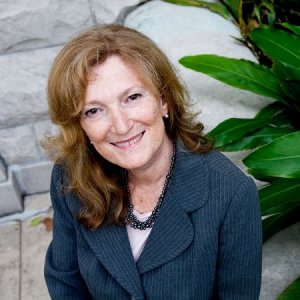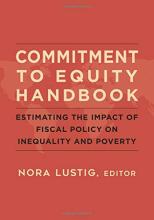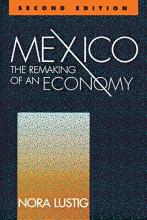Nora Lustig
Samuel Z. Stone Professor of Latin American Economics and Director of the Commitment to Equity Institute

Biography
I am an economist with a focus on Latin America interested in studying the causes of inequality and poverty and the public policies most effective in combating them. At Tulane, I founded and also direct the Commitment to Equity Institute which works to reduce inequality and poverty through analyzing the impact of taxes and government spending and active engagement with the policy community. I am also a nonresident senior fellow at the Brookings Institution, the Center for Global Development and the Inter-American Dialogue.
As a native from Argentina, I was always intrigued by the causes of persistent inequities within countries and why some countries were rich while others remained poor or stuck in the middle of the road. I started my career as a faculty member of El Colegio de Mexico. While living in Mexico, I witnessed the harmful consequences of economic crises and austerity programs first-hand. I became a researcher, and eventually a relentless advocate, of safety nets for the poor and those hurt by fiscal cutbacks and market-oriented reforms.
I left Mexico to join the Brookings Institution as a senior fellow. Brookings was a unique window to policymaking in the United States and I was an active participant in policy debates including testifying in the US Congress. Afterwards, I became Senior Advisor on Poverty at the Inter-American Development Bank. Subsequently, and before joining Tulane, I was Director of the global Poverty Group at the United Nations Development Programme, and Shapiro Visiting Professor of International Affairs at the George Washington University. My experience as an academic in Mexico and the United States, a researcher at Brookings, and in senior positions at multilateral organizations has given me a unique perspective on how knowledge can inform policymaking and how to translate research results into policy actions.
To strengthen research networks interested in the region, I was a founding member and President Emeritus of the Latin American and Caribbean Economic Association (LACEA). I currently serve on the editorial board of the Journal of Economic Inequality and I a member of the Society for the Study of Economic Inequality’s Executive Council. I also served on the Atkinson Commission on Poverty, the High-level Group on Measuring Economic Performance and Social Progress, and the G20 Eminent Persons Group on Global Financial Governance.
Education
University of California, Berkeley
University of California, Berkeley
University of California, Berkeley
Accomplishments
Tulane University School of Liberal Arts Outstanding Research Award
2012
Links
Articles
Fiscal policy, inequality, and poverty in Iran: assessing the impact and effectiveness of taxes and transfers
Using the Iranian Household Expenditure and Income Survey for 2011/12, we estimate the impact and effectiveness of various components of Iran’s fiscal system on reducing inequality and poverty. We utilize the marginal contribution analysis to determine the impact of each component, and we introduce newly developed indicators of effectiveness to calculate how well various taxes and transfers are operating to reduce inequality and poverty. We find that the fiscal system reduces the poverty-head-count-ratio by 10.5 percentage points and inequality by 0.0854 Gini points. Transfers are generally more effective in reducing inequality than taxes while taxes are especially effective in raising revenue without causing poverty to rise. Although transfers are not targeted toward the poor, they reduce poverty significantly. The main driver is the Targeted Subsidy Program (TSP), and we show through simulations that the poverty reducing impact of TSP could be enhanced if resources were more targeted to the bottom deciles.
Fiscal Policy, Income Redistribution, and Poverty Reduction: Evidence from Tunisia
This paper estimates the impact of Tunisia's tax and transfer system on inequality and poverty and assesses the benefits from public spending on education and health. Results show that Tunisia's redistributive fiscal policy reduces inequality and extreme poverty significantly. However, based on the national poverty line, the headcount ratio increases, implying that a large number of the poor people pay more in taxes than they receive in cash transfers and subsidies. This is due to a relatively high burden of personal income taxes and social security contributions for low‐income households.
Fiscal Redistribution and Ethnoracial Inequality in Bolivia, Brazil, and Guatemala
Afro-descendants and indigenous peoples in Latin America face higher poverty rates and are disproportionately represented among the poor. The probability of being poor is between two and three times higher for indigenous and Afro-descendants than whites. Using comparable fiscal incidence analyses for Bolivia, Brazil, and Guatemala, I analyze how much poverty and inequality change in the ethnoracial space after fiscal interventions. Although taxes and transfers tend to reduce the ethnoracial gaps, the change is very small. While per capita cash transfers tend to be higher for the nonwhite population, spending on these programs is too low, especially when compared with the disproportionate number of poor people among nonwhites.
Inequality and Fiscal Redistribution in Middle Income Countries: Brazil, Chile, Colombia, Indonesia, Mexico, Peru and South Africa
This paper examines the redistributive impact of fiscal policy for Brazil, Chile, Colombia, Indonesia, Mexico, Peru and South Africa using comparable fiscal incidence analysis with data from around 2010. The largest redistributive effect is in South Africa and the smallest in Indonesia. Success in fiscal redistribution is driven primarily by redistributive effort (share of social spending to GDP in each country) and the extent to which transfers/subsidies are targeted to the poor and direct taxes targeted to the rich. While fiscal policy always reduces inequality, this is not the case with poverty. When pensions are not considered a transfer, fiscal policy increases poverty in Brazil (over and above market income poverty) due to high consumption taxes on basic goods. Total spending on education is pro-poor except for Indonesia, where it is neutral in absolute terms. Health spending is pro-poor in Brazil, Chile and South Africa, roughly neutral in absolute terms in Mexico, and not pro-poor in Indonesia and Peru.
Comparing the Incidence of Taxes and Social Spending in Brazil and the United States
We perform the first comprehensive fiscal incidence analyses in Brazil and the U.S., including direct cash and food transfers, targeted housing and heating subsidies, public spending on health and education, and taxes on personal income, payroll, corporate income, property, and expenditures. The countries share a number of similarities that make the comparison interesting, including high levels of inequality given their levels of development, high inequality of opportunity, large and racially diverse populations, and similar sizes of government. The U.S. achieves higher redistribution through direct taxes and transfers, primarily because Brazil underutilizes personal income taxes and keeps its progressive cash and food transfer programs small, while its larger transfer programs are less progressive. When public spending on health and non‐tertiary education is added to income using the government cost approach, however, the two countries achieve similar levels of redistribution.
Media Appearances
How much does the world spend on the Sustainable Development Goals?
A few initiatives such as the Base Erosion and Profit Shifting agenda being pursued by the OECD, the efforts to address taxation of mining companies, clampdowns on tax evasion, and strengthening of domestic tax systems through the Addis Tax Initiative, are all promising. Many of these measures would help address the problem of illicit financial flows that are a contributing factor to a number of countries’ financing gaps. But we would also sound a word of caution. Fiscal systems in many developing countries are often regressive, in the sense of poor people paying more in taxes than they receive in subsidy equivalents. Relying more heavily on fiscal mechanisms to achieve the SDGs therefore requires both an improved effort to raise taxes as well as a major structural overhaul of taxes and subsidies. Absent this, it can simply lead to “fiscal impoverishment,” to use a term coined by Nora Lustig and colleagues at the Commitment to Equity Institute.
A radical proposal to fight poverty in the developing world: tax the rich more than the poor
But only recently has data made clear just how limited the impact of government redistribution in many developing countries is. That finding emerged in a series of studies by the economist Nora Lustig and colleagues at the Commitment to Equity Institute at Tulane University.
Income Gap Shrinks in Chile, for Better or Worse
“Latin America is experiencing a pervasive decline of inequality when in many other regions it is rising,” said Nora Lustig, an economics professor at Tulane University who has been closely following the trends. “The decline in the 2000s was bigger than the increase in the 1990s, so it’s not insignificant.”
The world’s leading development economists can’t agree on how to tackle inequality
Then there’s the issue of measurement and, ultimately, policy. Some skewed income distributions look less so once the effect of taxes and social programs are taken into account. Others, it turns out, look worse. Tulane University Latin America expert Nora Lustig calculates that while Brazil’s highly-touted transfer payments have helped grow the middle class, they are for some income groups almost completely wiped out by the country’s high and highly regressive value added tax.
Gini back in the bottle
According to Nora Lustig, an economist at the University of Tulane and one of the first to document the narrowing of the region's income gaps, ...
In the News
El Pais: La nueva edad de oro del cobre y la soja da oxígeno a América del Sur
Bloomberg: Covid’s Shockwaves Took Poverty in Latin America to a New Nadir
Americas Quarterly: School’s Out in Most of Latin America. Gangs Are Thrilled.
Bloomberg: Latin America’s Schools Are Flunking Covid
Explica: AMLO’s austerity deepens crisis, says WSJ
Wall Street Journal: Mexico's Leftist President Becomes Fiscal Hawk in Midst of Pandemic
The Economist: Latin America’s new poor
Vox: A radical proposal to fight poverty in the developing world: tax the rich more than the poor
UNAIDS: Uniting behind a people’s vaccine against COVID-19







